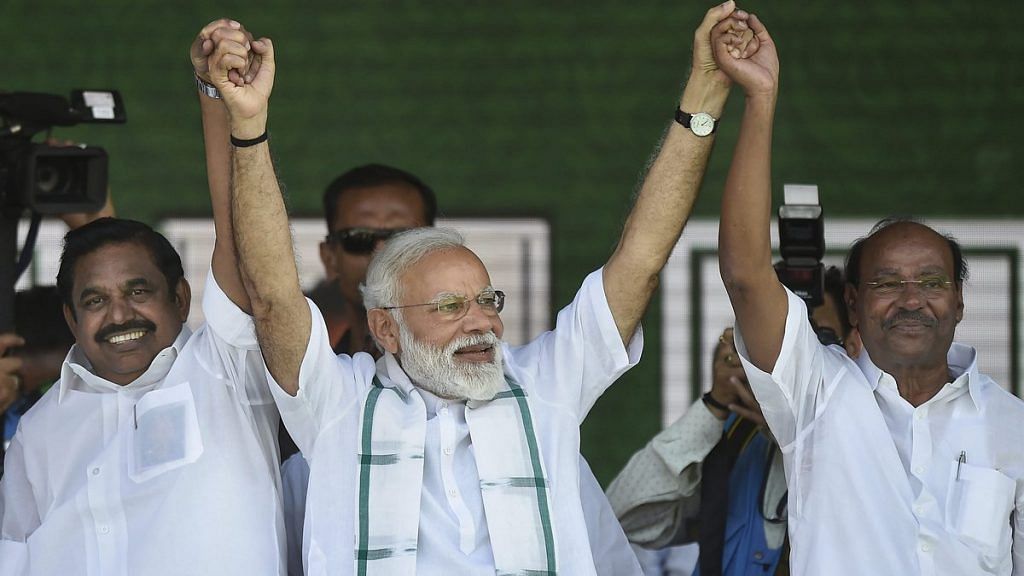Within a week of the Narendra Modi-led government returning to power, the political gloves have truly come off with the release of the draft National Education Policy 2019. The submission of the draft has once again stirred up the debate on the Bharatiya Janata Party’s efforts to impose Hindi on non-Hindi speakers, drawing backlash and protests from southern states led by Tamil Nadu.
With a meek ally in AIADMK at the helm of affairs in Tamil Nadu, the BJP-led National Democratic Alliance is out to implement the three-language formula in school education, which has been the subject of countless controversies since Independence. Though the Modi government has clarified that this is only a draft report and feedback from the public will be taken before, this issue provides a grim glimpse into the extent of cultural imposition which may be unleashed over the next five years.
Inside the draft
The committee for draft NEP was constituted by the previous government, under the chairmanship of K Kasturirangan, to build on the report submitted by the Committee for Evolution of the New Education Policy in May 2016. The preamble of the draft NEP states that it is founded on the “guiding goals of access, equity, equality, affordability and accountability”. Sadly, the Kasturirangan Committee has failed to comprehend the obvious challenges to equality posed by the three-language formula on non-Hindi speakers.
Also read: Almost every Tamil Nadu leader is against Modi’s draft education policy over Hindi
Specifically, the offending section found in P.4.5.9 on page 84, ironically titled “Flexibility in the Choice of Language”, states that “the study of languages by students in the non-Hindi-speaking states would include the regional language, Hindi and English.” This formula has been rejected outright by Tamil Nadu over a series of ill-fated attempts leading up to the 1960s to replace English with Hindi.
New policy, old division
Under any other circumstances, such a policy position would have been viewed as a natural progression of the political agenda to saffronise the nation. However, coming shortly after the humiliating electoral defeat in Tamil Nadu, the BJP has given the impression it was eager to retaliate against the voters of the state. In any case, this only strengthens the strong suspicion held by non-Hindi speakers that the BJP is a Hindi-heartland party, which has no qualms in prioritising one Indian language over all others.
Also read: Larger Supreme Court bench to hear plea against Sanskrit shlokas, Hindi prayer at KVs
What is particularly troubling about the proposed policy change is that it does not take into account the chequered history of the language policy-related disputes. From 1937 to 1940, then 1948 to 1950, and 1953 to 1956 then 1959 to 1961, and finally 1963 to 1965 — the anti-Hindi imposition struggles of erstwhile Madras Presidency and current state of Tamil Nadu have been inextricable with the progress of the Dravidian Movement. The subsequent electoral successes of Dravidian politics and ideology is in no small part due to people’s belief that Dravidian parties have safeguarded Tamil and resisted the imposition of Hindi.
No Hindi a disadvantage?
What the new and revised National Education Policy requires is the expansion of the choice of languages. Next generation students must be allowed to choose languages that they consider to be important and not be compelled to learn Hindi, which would place non-Hindi speakers at an immediate disadvantage compared to Hindi speakers.
Also read: The Hindi news channel editor who ‘thrives on provoking’ Hindu, Muslim sentiments
The way forward is to treat all languages currently in the Eighth Schedule of the Constitution of India on equal footing. Any preferential treatment to one language at the expense of others will create friction, disharmony and unrest.
Soon after the electoral victory in the 2019 Lok Sabha elections, Narendra Modi spoke about a “New India”. Whether this would herald the rise of New “Hindia” wherein non-Hindi speakers would be treated as lesser citizens is something the Modi government must seriously ponder.
The author is DMK spokesperson and advocate, Madras High Court. Views are personal.
